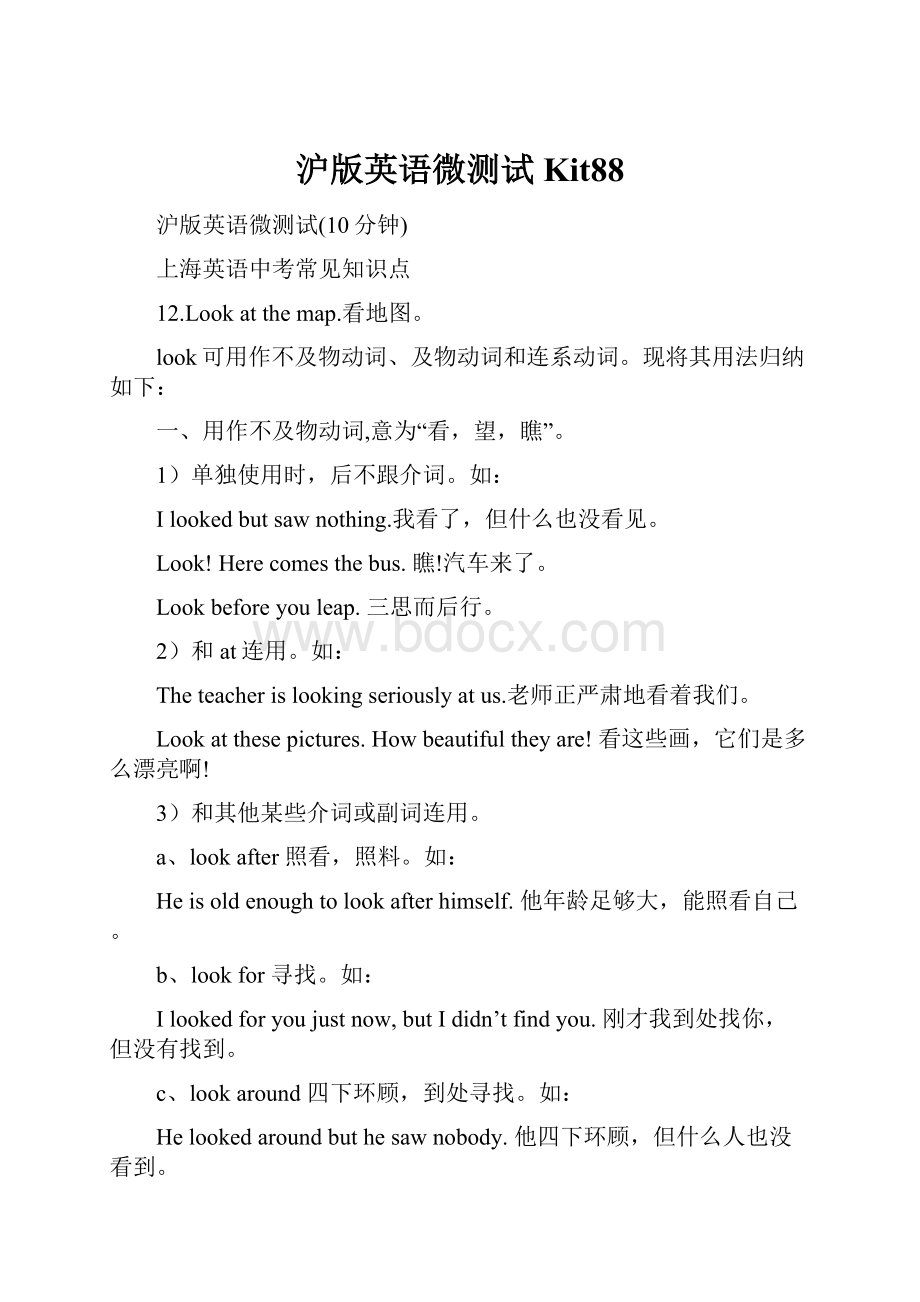沪版英语微测试Kit88.docx
《沪版英语微测试Kit88.docx》由会员分享,可在线阅读,更多相关《沪版英语微测试Kit88.docx(8页珍藏版)》请在冰豆网上搜索。

沪版英语微测试Kit88
沪版英语微测试(10分钟)
上海英语中考常见知识点
12.Lookatthemap.看地图。
look可用作不及物动词、及物动词和连系动词。
现将其用法归纳如下:
一、用作不及物动词,意为“看,望,瞧”。
1)单独使用时,后不跟介词。
如:
Ilookedbutsawnothing.我看了,但什么也没看见。
Look!
Herecomesthebus.瞧!
汽车来了。
Lookbeforeyouleap.三思而后行。
2)和at连用。
如:
Theteacherislookingseriouslyatus.老师正严肃地看着我们。
Lookatthesepictures.Howbeautifultheyare!
看这些画,它们是多么漂亮啊!
3)和其他某些介词或副词连用。
a、lookafter照看,照料。
如:
Heisoldenoughtolookafterhimself.他年龄足够大,能照看自己。
b、lookfor寻找。
如:
Ilookedforyoujustnow,butIdidn’tfindyou.刚才我到处找你,但没有找到。
c、lookaround四下环顾,到处寻找。
如:
Helookedaroundbuthesawnobody.他四下环顾,但什么人也没看到。
d、lookbackon回想,回顾。
如:
Theyoftenlookbackonthedaystheyspenttogether.他们常回顾他们在一起度过的日子。
e、lookdownon看不起。
如:
Don’tlookdownonothers.不要看不起别人。
f、lookforwardto盼望。
如:
Wearelookingforwardtoseeingyouagain.我们盼望再见到你。
g、lookinto朝……里面看。
如:
Helookedintothebox,buthesawnothing.他朝箱子里面看了看,但没看到什么。
h、lookon...as把某人看做。
如:
Welookonhimasourfriends.我们把他看做我们的朋友。
i、lookout当心。
如:
Lookout!
Don’thitthetree.当心!
不要撞了树。
j、lookover仔细检查,翻阅。
如:
Thedoctorislookinghimover.医生正在给他做仔细检查。
k、lookthrough浏览;仔细检查;看穿。
如:
Ihavelookeditthrough.我已把它仔细地看了一遍。
l、lookup抬头看;查;找出。
如:
Helookedupandsmiledatme.他抬起头,对我笑了笑。
Iftherearewordsyoudon’tunderstand,lookthemupinthedictionary.如果你有不认识的单词可以查词典。
二、用作连系动词,意为“看起来”。
1)后跟形容词。
如:
Youlookwell/fine/healthy.你看起来很健康。
Theteacherlookshappy.老师看上去很高兴。
Shelookspale.她面色苍白。
2)后跟过去分词。
如:
Youlooktired;you’dbetterhavearest.你看上去很累,你最好休息一下。
3)后跟名词。
如:
Helooksanice,honestman.他看上去是个诚实的好人。
4)后跟介词短语等。
如:
Helooksingoodhealth.他看来十分健康。
三、用作及物动词,意为“看,瞧,打量”等。
如:
Heislookingmeupanddown.他上下打量着我。
13.?
Shedoesn’tgotoworkbybus.她不是坐公共汽车去上班。
如何将一般现在时的肯定句改成否定句。
不含有“be”动词的一般现在时的肯定句,在改成否定句时,首先要想到助动词“do”或“does”,构成“donot/don’t”或“doesnot/doesn’t”否定结构。
其中,“does”只能用在主语是第三人称单数时,还要记得把动词的第三人称形式改为原形;“do”用在主语不是第三人称单数时。
如:
1、、Hewritesthenewwordseveryevening.?
?
(肯定句)
Hedoesn’twritethenewwordseveryevening.?
(否定句)
2、WegotoschoolonSundays.(肯定句)
Wedon’tgotoschoolonSundays.(否定句)
3、XiaoLireadsnewspapereveryday.(肯定句)
XiaoLidoesn’treadnewspapereveryday.(否定句)
4、Thebluebirdsingseverymorning.?
?
(肯定句)
Thebluebirddoesn’tsingeverymorning.?
?
(否定句)
14.?
Whatisit?
这是什么?
what引导的疑问句
?
此类疑问句可以对主语、表语和宾语提问。
1).对主语提问,如:
Whatisinyourpocket?
你口袋里有什么?
☆这个问题可以有两种回答:
a.Thereisanegginit.在口袋里有一个蛋。
b.Aneggis(init).一个蛋(在里面)。
What'sintheroom?
屋子里有什么?
Therearealotofchairsinit.
注意
回答此句型的问题时,答句的单复数根据实际情况而定。
2).对宾语提问,如:
Whatdidyoubuy?
你买了什么?
Iboughtabike.我买了辆自行车。
3).对表语提问,如:
Whatisthis?
这是什么?
It'sabench.这是一条长凳。
Whatisyourmother?
你妈妈是干什么的?
注意
Whatis+人?
此句型是问人的职业,一般译为“是干什么的?
”
Sheisateacher.她是个老师。
II
Choosethebestanswer:
Thetraditionofbirthdaypartiesstartedalongtimeago.Therearesometraditionsthatyoucanfindalmostanywhere,anytime,suchassendingbirthdaycards,blowingoutthecandlesonabirthdaycakeandsingingthe‘HappyBirthday’song.Othersareonlyfoundforcertainagesandincertaincountries.
InChina,onachild’ssecondbirthday,familymembersputmanythingsontheflooraroundthechild.AccordingtoChinesetradition,thefirstthingthatthechildpicksuptellsyouwhatprofessionthechildwillchooselaterinlife.
ForJapanesechildren,thethird,fifthandseventhbirthdaysareespeciallyimportant.Atthisage,thereisaspecialcelebrationShichi-Go-San(seven,five,threeinJapanese)whenchildrengotothetemplewearinganewkimono(和服).Thepriest(僧侣)givesthemspecialsweets,andtheparentsusuallyorganizeapartyfortheirfriendsintheirhome.
InArgentina,MexicoandseveralotherLatinAmericancountries,girlshaveaspecialbirthdaycelebrationwhentheyreachtheageoffifteen.Afteraspecialceremony(仪式),thegirlsdanceawaltzwiththeirfatherandotherboys.
Eighteenisthetraditional‘comingofage’—theagewhen(inmanycountries)youhavetherighttovote(选举),jointhearmyand(inBritain)drinkalcoholorbuyahouse.
InmanyEnglish-speakingcountries,atwenty-firstbirthdaycakeoftenhasakeyontop,orthecakeitselfissometimesintheshapeofakey.Thekeymeansthattheyoungpersonisnowoldenoughtoleaveandenterthefamilyhomeatanytimetheywantto!
84.Whichofthefollowingbirthdaytraditionscanbefoundalmostanywhere,anytime?
(A)Puttingmanythingsonthefloor.
(B)Wearinganewkimono.
(C)Dancingawaltz.
(D)Sendingbirthdaycards.
85.Theusuallyorganizeapartyatchildren’sspecialbirthdaycelebrationinJapan.
(A)priests
(B)parents
(C)friends
(D)relatives
86.Mexicangirlshaveaspecialbirthdaycelebrationattheageof.
(A)five
(B)seven
(C)fifteen
(D)twenty-one
87.Inmanycountriesyoucan________whenyoureachtheageofeighteen.
(A)jointhearmy
(B)haveakey
(C)haveaspecialceremony
(D)havespecialsweets
88.WhichofthefollowingsentencesisNOTtrue?
(A)Thetraditionofbirthdaypartiesstartedalongtimeago.
(B)Somebirthdaytraditionsareonlyfoundincertaincountries.
(C)Youbecometheownerofyourhouseattheageoffifteen.
(D)Inmanycountriesyouhavetherighttovoteattheageofeighteen.
89.Whichisthebesttitleofthispassage?
(A)BirthdayTraditionsaroundtheWorld
(B)ChineseBirthdayCelebrations
(C)JapaneseSpecialCelebration
(D)TheDrinkingAgeinManyCountries
Choosethewordsorexpressionsandcompletethepassage:
AllaboutBritain’sTeenagers
School
BritishteenagerscanleaveschoolatsixteenaftertakingtheirGCSEexams.Theystudyforexamsinasmanyastensubjects,90theyhavetoworkprettyhard!
Today’steensspendmoretimedoingtheirhomeworkthananyteenagersinthepast,studyingfor2.5–3hourseveryevening.
FreeTime
It’snotallwork,ofcourse.WhatdoBritishteenagersdotohave91?
TheylovewatchingTV,goingout,meetingfriendsinInternetcafésandlisteningtomusic.
Communications
InadditiontotheInternet,teenagersinBritainusetheircomputerstoplaygamesanddotheirhomework.They92lovetheirmobilephones,andspendhourstexting(发短信)theirfriendsandchatting.Today,phonesaregettingsmallerandlighterandyoucandoalotmore
93themthanjusttalk.Textmessaginghasbecomethecoolestandmostpopularwaytocommunicate.Morethan90%of12-to16-year-oldshaveamobile,andexpertssaythatthisstops94fromspendingtheirmoneyonsweetsandcigarettes.
Fashion(服饰)
Atschool,almostallBritishteenagershavetowearaschooluniform.However,intheirfree
95theycanwearwhatevertheylike,andwhattheylikeisdesignernamessuchasNike,DieselandPaulSmith.Infact,40%ofBritishteenssaythattheythinkitisimportanttohavethelatestfashion.Lookinggooddoesn’tcome96,butmanyteenagersthinkitusualoreasytospendmorethan£100ononeitemofclothing.
90.
(A)but
(B)or
(C)so
(D)because
91.
(A)lessons
(B)sports
(C)advice
(D)fun
92.(A)never
(B)already
(C)also
(D)nolonger
93.(A)with
(B)for
(C)at
(D)in
94.(A)teachers
(B)relatives
(C)friends
(D)teenagers
95.(A)day(B)time(C)week(D)month
96.(A)cheap(B)expensive(C)special(D)ordinary